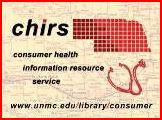 “Vulnerability is the birthplace of connection and the path to the feeling of worthiness. If it doesn’t feel vulnerable, the sharing is probably not constructive.”
–Brene Brown
“Vulnerability is the birthplace of connection and the path to the feeling of worthiness. If it doesn’t feel vulnerable, the sharing is probably not constructive.”
–Brene Brown
Recently, the Dude attended the Kaneko Information Exchange conference at
Kaneko-UNO Library. It’s hard to describe the space there; it might be apt to say it’s a cross between a modern, technology infused library and a hip art gallery. At any rate, a lot of fresh ideas were exchanged at the conference, and the subject of today’s post is about the consumer health information resource service (chirs) offered by the University of Nebraska Medical Center’s McGoogan Library of Medicine. One of the panelists at the Information Exchange (Teri Hartman) was from McGoogan and talked about chirs.
But before we get to that specific part (and if you only care about the chirs service, skip to the last paragraph), here is a little filler material of the sort that Brene mentions in the quote above. A couple of years ago, the Dude found himself with a health issue that required attention. Middle age, evidenced not only by these sorts of health circumstances (it was a hernia) is now a reality but not necessarily a catalyst for an abnormally depressive state. The Dude has no intention of buying a sports car, bar hopping with women that are half his age, completing extreme sporting events (which may mean different things to different people), dyeing his hair, or trotting off to Burning Man. Middle age for the Dude means the replacement of long runs and bike rides with long walks and tai chi chuan sessions; early morning workouts replaced with early morning sleep and late night insomnia; and other assorted fortuitous activities such as growing tropical plants and fixing things. It also means other adjustments, such as the simple acknowledgement of how life experiences are now just a bit different, and that’s OK.
Now as far as health information goes, the Dude believes in the importance of a well-informed patient. Navigating these waters is often difficult; when the hernia diagnosis hit there was a lot of research and weeding through questionable sources of information online. You see, some camps surrounding the Dude were quite adamant about not having a surgical repair at all; others wanted the Dude to drive to a knife jockey at the earliest possibility. What the Dude really wanted (and didn’t get much of) was someone who would acknowledge and support his process of
becoming (perhaps in a Kierkegaardian sense) health literate, and a medical professional that didn’t find a well informed patient threatening. In the end, the Dude was fortunate enough to have an overall positive experience, and credits this to taking the time to become health literate and in finding such a patient and knowledgeable surgeon. For the record, if you want to know about things like Desarda or Bassini techniques, differences in brands and types of mesh typically used for repairs, and the journey to ultimately finding someone to fix the problem (the Dude had a good experience at Creighton Med. Center), let the Dude know. In the Dude’s case, being literate in the area of concern (that’s a runaround way of saying he wanted as much preferably unbiased information as possible about hernias) meant not only determining a course of treatment but also selecting a health care professional.
The point here is that two years ago, the chirs service was not on the radar and therefore it wasn’t utilized. In retrospect, the service could have been extremely helpful. At the Kaneko Information Exchange, Teri Hartman (Education and Research Services Librarian at UNMC’s McGoogan Library of Medicine) talked at length about the free service. And you should at least be aware of it, if not actively promoting it in your library. The
chirs web page contains a summary of the service, links to sites containing health information, contact information, and the
chirs online request form. You should also keep
NebraskAccess in mind as a potential source of information. Finally, thanks to Teri Hartman and her contributions to the Kaneko Information Exchange. In case you didn’t catch it yet, the chirs service is
free. Shaka, Teri.
“Vulnerability is the birthplace of connection and the path to the feeling of worthiness. If it doesn’t feel vulnerable, the sharing is probably not constructive.” –Brene Brown

